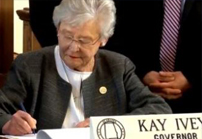June 11, 2019—-3:10 P.M.
WEIS RADIO/ AL.com
 Monday afternoon Governor Kay Ivey signed into law a bill to require sex offenders whose victims are younger than 13 to undergo “chemical castration treatment” as a condition of parole.
Monday afternoon Governor Kay Ivey signed into law a bill to require sex offenders whose victims are younger than 13 to undergo “chemical castration treatment” as a condition of parole.
The treatment consists of taking medication to suppress or block the production of testosterone.
The bill was sponsored by Republican Steve Hurst of Munford and passed on Thursday, May 30, the next-to-last day of the legislative session. Hurst had sponsored similar bills for more than a decade and said his intention has always been to stop sexual abuse of children.
“I’m very serious,” Hurst said. “Not only did I want it to pass, but I also want to follow it on through to the future where we can try to improve it. One of the ultimate goals that I want to do is for us to track it and to make sure what medication works for what individuals.”
Hurst said he’s heard from many victims of sexual abuse supporting the effort.
Other states have passed similar laws, including California and Florida in the 1990s.
The chemical castration law says sex offenders whose victims were younger than 13 will have to take “medroxyprogesterone acetate treatment or its chemical equivalent, that, among other things, reduces, inhibits, or blocks the production of testosterone, hormones, or other chemicals in a person’s body.”
The law requires the treatment to begin at least one month before a parolee is released. The parolee is required to pay for the treatment unless a court determines he cannot. The Alabama Department of Public Health will administer the treatments.



